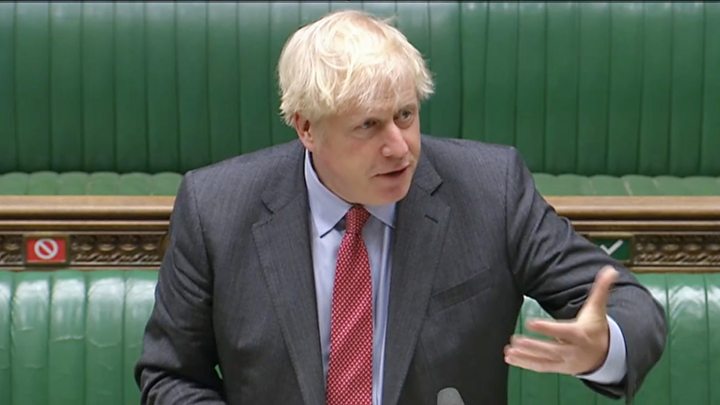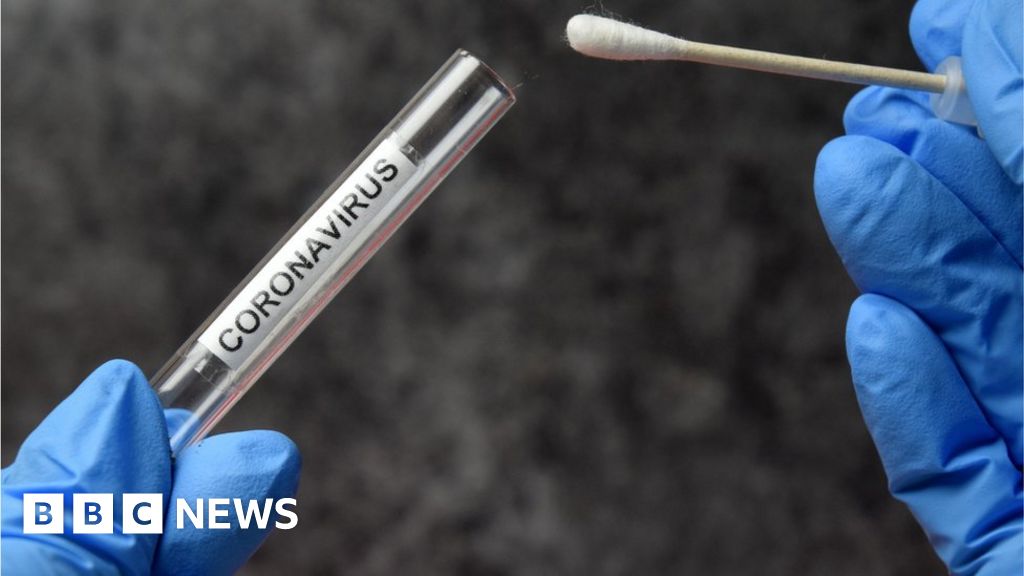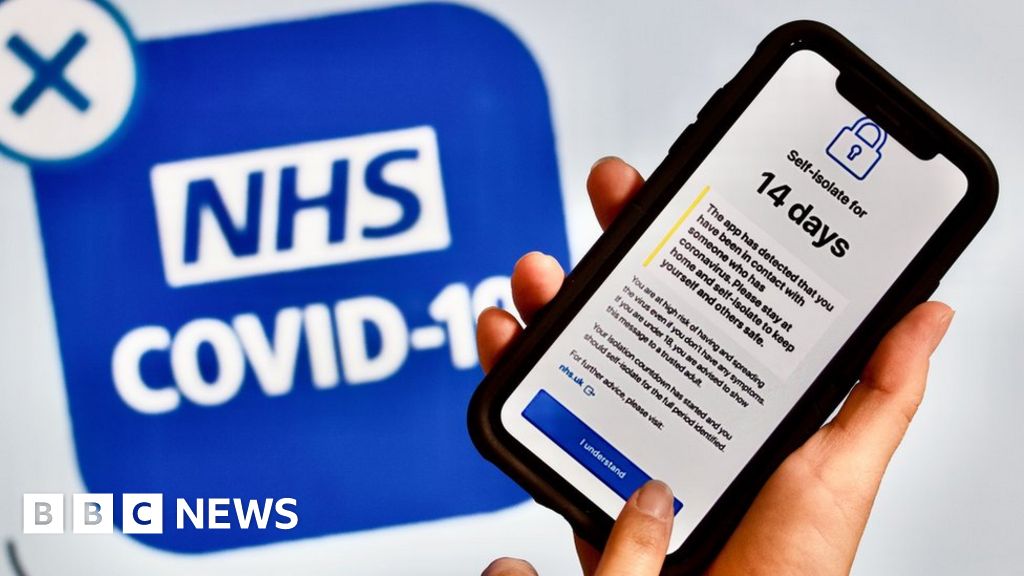Media playback is unsupported on your device
The UK has reached "a perilous turning point", Prime Minister Boris Johnson said, as he set out a raft of new coronavirus restrictions for England which could last for up to six months.
Shop staff will have to wear face masks and weddings will be limited to a maximum of 15 people, under new rules.
Fines for breaking laws on gatherings and not wearing mask will increase to £200 for a first offence.
He also warned "significantly greater restrictions" could come if necessary.
Mr Johnson said "similar steps" would be taken across the UK after meeting with the leaders of Scotland, Wales and Northern Ireland on Tuesday morning.
"We always knew that while we might have driven the virus into retreat, the prospect of a second wave was real. I'm sorry to say that, as in Spain and France and many other countries, we've reached a perilous turning point," he said.
Mr Johnson told the House of Commons he would provide police and local authorities with extra funding to enforce the regulations and the option to draw on military support.
He also confirmed that office workers were being asked to work from home once again, if possible.
He said the new rules were "carefully judged" to achieve the maximum reduction in the R number - which measures how quickly the virus is spreading - while causing "the minimum damage to lives and livelihoods".
Mr Johnson said this was "by no means a return to the full lockdown of March", with no general instructions to stay at home. Businesses, schools, colleges and universities will remain open.
Attendance figures show the number of schools in England sending home groups of pupils due to Covid-19 incidents quadrupled in a week, however.

Media playback is unsupported on your device
In the last fortnight, hospital admissions have doubled and Covid-19 is likely to spread faster in winter, Mr Johnson said, adding: "So this is the moment when we must act."
If these restrictions fail to bring the R number below one - the point where the epidemic is no longer growing - "then we reserve the right to deploy greater fire power with significantly greater restrictions" he said.
Mr Johnson said: "We will spare no effort in developing vaccines, treatments, new forms of mass-testing but unless we palpably make progress we should assume that the restrictions that I have announced will remain in place for perhaps six months."
Under the new measures:
Penalties for not wearing a mask or gathering in groups of more than six will increase to £200 on the first offence From Thursday, all pubs, bars and restaurants will be restricted to table service only. Takeaways can continue Hospitality venues must close at 22:00 - which means shutting then, not calling for last orders" Office workers are being told to work from home if possible The planned return of spectators to sports venues will now not go ahead from October 1 Face coverings must be worn by shop staff, taxi drivers and passengers Customers in indoor hospitality venues will also have to wear masks, except when seated at a table to eat or drink Exemptions to the "rule of six" will be cut back, meaning indoor team sports such as five-a-side football matches will end.'Tough calls are still to come'
With hospital admissions and deaths still low, there is a window of opportunity before more difficult decisions have to be taken.
That's why the restrictions taken by ministers, which may be in place for as long as six months, are somewhat more limited than the warning by scientists on Monday that cases could reach 50,000 cases a day suggested was needed.
But even if the public does take more care and these steps have an impact, it remains doubtful the rise in cases will actually be stopped.
This is a virus which can be transmitted silently - people are infectious before symptoms develop, while some do not even develop any - and we are entering the time of year when respiratory illnesses circulate more and deaths start to increase.
Most experts doubt the 50,000-cases-a-day figure will be reached by October, but it would be a big surprise if the infection rate does not continue to gradually climb.
The government will then have a big decision to take - not necessarily about whether to introduce a full lockdown - but if more significant steps such as stopping households mixing and closing hospitality and leisure facilities are needed.
How far is it prepared to go to contain the virus? How much economic pain and disruption to people's live and to wider wellbeing is worth the lives that are at risk?
The really tough calls are still to come.
Labour leader Sir Keir Starmer said he supported "necessary" stricter measures, but added that families were worried "the government doesn't have a strategy".
"One day people were encouraged to work in the office, in fact more than encouraged they were openly challenged by the prime minister for not doing so. Today they're told the opposite," he said.
"This is a time of national crisis but we need clear leadership."
Sir Keir said it would be a "disaster" to withdraw the furlough scheme in "one fell swoop" with no additional support for people whose jobs might be at risk.
The CBI, which represents business, said it was "desperately urgent" to announce a targeted replacement for the furlough scheme.
"It has saved thousands and thousands of jobs but there is a cliff-edge looming. And, now, with today's announcement that is more urgent than ever," said director general Dame Carolyn Fairbairn.
Some business owners said the new rules would make life even harder. Marc Gough, who runs a crockery and glassware business in the wedding and events sector, said the cut to the limit for weddings to 15 was "heart-breaking".
"I can't earn a living because you're restricting me to weddings of 15 people," Mr Gough told BBC Radio 5 Live, adding that the turnover of his business had fallen from £750,000 to £20,000.
"To walk into that warehouse, to put a smile on my face to the staff that I have left, to the clients that I deal with constantly, the brides, it's truly heart-breaking," he said.
Are the new restrictions going to affect you? Will your wedding be affected? Share your experiences by emailing haveyoursay@bbc.co.uk.
Please include a contact number if you are willing to speak to a BBC journalist. You can also get in touch in the following ways:
WhatsApp: +44 7756 165803 Tweet: @BBC_HaveYourSay Please read our terms & conditions and privacy policy
 5 years ago
1063
5 years ago
1063 

